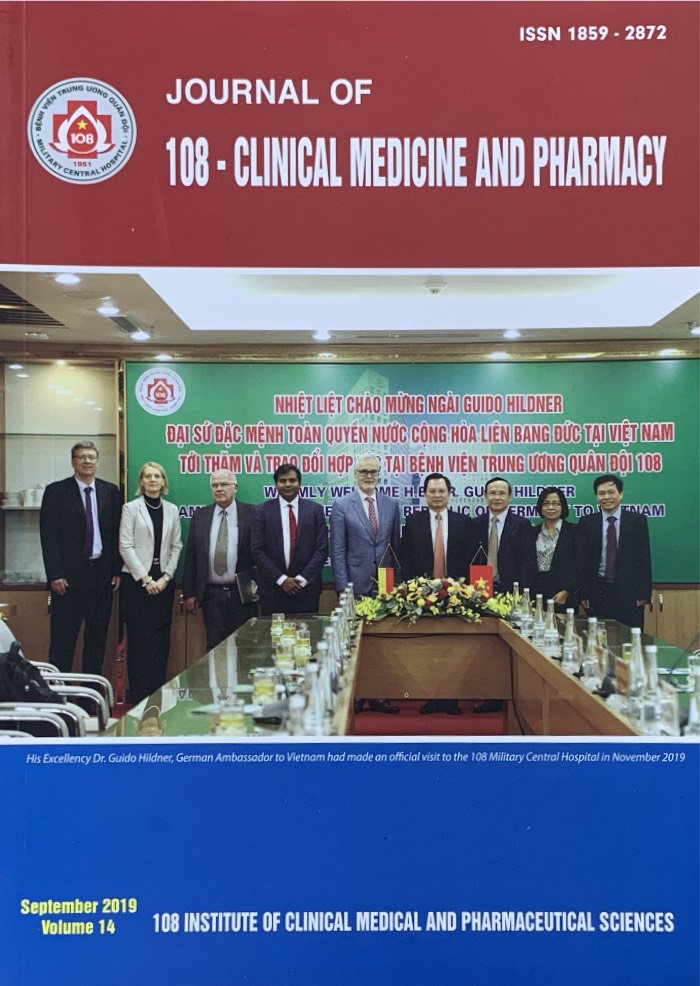New approach in minimally invasive surgery for treatment of rectal cancer: Transanal laparoscopic surgery
Main Article Content
Keywords
Tóm tắt
Objective: To prospectively evaluate the short-term outcomes of transanal total mesorectal excision (TaTME) for rectal cancer. Subject and method: 56 patients with middle and low rectal cancer who underwent TaTME in Gastrointestinal Surgery Department, 108 Millitary Central Hospital from July 2017 to December 2018 were included in this study. The data of preoperative staging, tumor’s location, operative morbidity, macropic quality of mesorectal specimen, circumferental resection margin, anal sphincter function were collected. The method popularized by Quirke, Kirwan’s classification was used to assess to quality of mesorectal specimen, the sphincter function respectively. Patients were followed in the outpatient clinic 2 weeks after the surgery and then every 3 months in the first year. Statistical analysis was performed using SPSS 20.0. Result: The mean age of patients was 65.45 ± 11.18 years, the mean BMI was 20.5 ± 2.6kg/m2. The mean operative time was 147.8 ± 22.2 minutes. Operative morbidity rate was 28.6%, there was no operative mortality. The quality of mesorectal specimen was complete in 80.4%, nearly complete in 16.1%. The circumferential resection margin (CRM) was negative in 94.6%; The mean harvested lymph nodes was 8.24 ± 3.17. The mean follow-up time was 10.0 ± 3.9 months, one patient (1.8%) developed local and distant recurrence, disease-free survival and overall survival rates were 98.2% and 100% respectively. The sphincter function at 12 months postoperation assessed by Kirwan was Kirwan I in 58.5% and Kirwan II in 41.2%. Conclusion: The TaTME technique is safe and feasible with acceptable results, especially in the quality of mesorectal specimen and sphincter function.
Article Details
Các tài liệu tham khảo
2. Rahbari NN, Weitz J, Hohenberger W, Heald RJ, Moran B, Ulrich A & Laurberg S (2010) Definition and grading of anastomotic leakage following anterior resection of the rectum: A proposal by the International study group of rectal cancer. Surgery 147(3): 339-351.
3. Lacy AM, Tasende MM, Delgado S et al (2015) Transanal total mesorectal excision for rectal cancer: Outcomes after 140 patients. Journal of the American College of Surgeons 221: 415-423.
4. Xu W, Xu Z, Cheng H et al (2016) Comparison of short-term clinical outcomes between transanal and laparoscopic total mesorectal excision for the treatment of mid and low rectal cancer: A meta-analysis. Eur J Surg Oncol 42: 1841-1850.
5. Edge SB and Compton CC (2010) The American joint committee on cancer: The 7th edition of the AJCC cancer staging manual and the future of TNM. Ann Surg Oncol 17: 1471-1474.
6. Dindo D, Demartines N, and Clavien PA (2004) Classification of surgical complications: A new proposal with evaluation in a cohort of 6336 patients and results of a survey. Ann Surg 240: 205-213.
7. Quirke P, West NP and Nagtegaal ID (2014) EURECCA consensus conference highlights about colorectal cancer clinical management: The pathologists expert review. Virchows Arch 464: 129-134.
8. Kirwan WO, Turnbull RB, Fazio VW et al (1978) Classification of rectal function after resection. Br J Surg 65: 695-698.
9. Penna M, Hompes R, Arnold S (2017) Transanal total mesorectal excision: International registry results of the first 720 cases. Ann Surg 266: 111-117.
10. Zhang HW, Han XD, Wang Y et al (2012) Anorectal functional outcome after repeated transanal endoscopic microsurgery. World J Gastroenterol 18: 5807-5811.
 ISSN: 1859 - 2872
ISSN: 1859 - 2872
